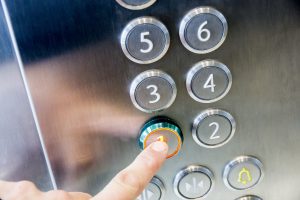 Elevator accidents can cause a lot of different injuries. Not all of them are physical, but any of them (physical or mental) can potentially be compensable with the right evidence.
Elevator accidents can cause a lot of different injuries. Not all of them are physical, but any of them (physical or mental) can potentially be compensable with the right evidence.
Given the number of web pages dedicated to interpreting them, dreams about being inside a falling elevator are not uncommon. For most people, such a dream would certainly fall inside the definition of a “nightmare.” For an unfortunate few, however, these nightmarish events are no dream; they are all too real. When they happen, they have the potential to inflict a variety of injuries. Even if you suffer no physical damage, you may still be left with severe and lasting emotional scars from your elevator accident. If that happens to you, be sure to contact a knowledgeable Louisiana injury attorney about your accident.
While not occurring in Louisiana, a recent event was an example of this kind of nightmare played out in real life. Global News reported on an elevator incident in Chicago. Six people exited a restaurant and entered an elevator on the 95th floor of the 100-story Chicago skyscraper formerly known as the John Hancock Center. According to the report, after the doors shut, the passengers began hearing strange noises. Those noises were the sound of two elevator cables breaking.
The elevator car plummeted 84 stories, coming to a stop at the building’s 11th floor. The experience was undeniably terrifying. One of the passengers told Vice News that “I thought that we were going to die.”
This brings us back to Louisiana. In the Pelican State, we have no 100-story skyscrapers, but tall buildings are present here. One Shell Square in New Orleans’s Central Business District is 51 stories high. So, while you will never have an 84-floor fall in a Louisiana elevator, you can experience some undeniably precipitous drops.
If that happens, what options do you have in court? The answer is potentially several. You may very possibly have a case that includes a winning claim for negligence. The building’s owner (or the tenant that has the contractual obligation to oversee maintenance and upkeep) has a legal duty requiring it to ensure that the elevators are inspected, repaired and maintained in such a way that they are safe for use.
In addition to pursuing the building’s owner or tenant, you may be able to bring a claim (or claims) against the company that performed the inspections and the company that performed the maintenance on the elevator.
You may be able to get a variety of damages in your case. If your accident caused you to suffer physical harm, then you can potentially recover your past and future medical expense damages. However, even if you did not suffer physical injuries, you may still have a substantial case. Louisiana law allows injured people to recover for things like pain and suffering and “mental anguish.”
Even if your elevator fell only 24 floors, not 84, that might be enough to leave lasting (or even permanent) mental scars. You might, as a result of the accident, suffer from anxiety/panic issues, depression or other psychological harm. Imagine working on one of the upper floors of the 51-story One Shell Square tower in New Orleans or the 34-floor Capitol Building in Baton Rouge and developing a deep and profound fear of riding in an elevator based upon your accident. That would certainly have a substantial negative impact on your life. With adequate proof, you may be entitled to an award based upon these psychological injuries.
To ensure that you get what you deserve from your elevator accident case, reach out to the Cardone Law Firm to find out more about how our skilled Louisiana elevator injury lawyers can help you. We are experienced, dedicated and ready to help you navigate the Louisiana legal system to arrive at a successful result.
For your confidential consultation contact us online or phone Cardone at 504-522-3333.
More Blog Posts:
I Was Injured in an Elevator. Can I Recover in Louisiana?, Louisiana Injury Lawyers Blog, Oct. 3, 2018
The Different Forms of Compensation to Which You May Be Entitled in Your Louisiana Elevator Accident Case, Louisiana Injury Lawyers Blog, June 21, 2018
 Louisiana Injury Lawyers Blog
Louisiana Injury Lawyers Blog

